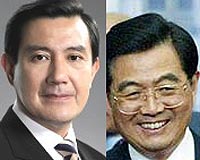| . |  |
. |
Washington (AFP) July 27, 2009 US President Barack Obama on Monday called for broad cooperation with China to set the course of the 21st century, saying the relationship between the Pacific powers was "as important as any" in the world. Kicking off two days of in-depth talks in Washington, Obama appealed for cooperation on a broad range of issues from reviving the global economy to fighting climate change, while also nudging Beijing on human rights. "The relationship between the United States and China will shape the 21st century, which makes it as important as any bilateral relationship in the world," Obama said. "That reality must underpin our partnership. That is the responsibility we bear," he said. In what appeared to be a coordinated new slogan, both Obama and Chinese President Hu Jintao, who sent a message to the meeting, said they sought a "positive, constructive, and comprehensive relationship." "Our two countries should endeavor to expand common ground, reduce differences, enhance mutual trust and strengthen cooperation," Hu said. Obama, who is expected to travel to China later this year, has sought to broaden the relationship with Beijing which is now the largest creditor to the heavily indebted United States. The dialogue revamps an earlier set of talks launched under former US president George W. Bush in 2006 that focused solely on economic issues. But China, whose delegation is led by State Councilor Dai Bingguo and Vice Premier Wang Qishan, said it would press the United States on concerns including over the safety of its more than 750 billion dollars invested in US Treasury bonds. A senior US official said the first day of talks, led by Secretary of State Hillary Clinton and Treasury Secretary Timothy Geithner, was "very constructive, very candid," but mostly general. "We're going to spend most of our time getting to know each other," David Sheer, director of China affairs at the State Department, told reporters on a conference call. He said the two sides would identify "common interests" to pursue in future sessions. US leaders have generally refrained from describing the China relationship as the "most important" in the world. Clinton used the language during her failed presidential bid, raising concerns among some US allies, particularly Japan. Clinton on Monday rejected predictions of a "multi-polar world," often used as codeword by Chinese, Russian and other policymakers to signal the end of a US-dominated era. "Although past relations between the United States and China have been influenced by the idea of a balance of power among great nations, the fresh thinking of the 21st century moves us from a multi-polar world to a multi-partner world," Clinton said. Both Clinton and Obama, while pledging not to see China as a rival, also acknowledged differences with the rising Asian power -- particularly on human rights. Obama said that the United States respected China's "ancient culture" but added: "We also strongly believe that the religion and culture of all peoples must be respected and protected, and that all people should be free to speak their minds. "That includes ethnic and religious minorities in China, as surely as it includes minorities within the United States," said Obama, the first president from the historically oppressed African-American community. The US-China dialogue comes shortly after the eruption of ethnic violence in China's Muslim-majority Xinjiang province, which left at least 192 people dead and raised calls by some US lawmakers to get tougher on Washington. The US leader asked for China's cooperation on a "low-carbon" recovery to the world economy, saying that the two largest carbon-emitting nations had a responsibility to work for a new global climate treaty by December's deadline. Obama sought China's assistance on ending North Korea and Iran's nuclear drives. He raised the specter of a nuclear arms race in East Asia. Pyongyang, which counts Beijing as its main ally, has tested a nuclear bomb, test-fired missiles and stormed out of a six-nation disarmament deal in recent months.
Share This Article With Planet Earth
Related Links Learn about the Superpowers of the 21st Century at SpaceWar.com Learn about nuclear weapons doctrine and defense at SpaceWar.com
 China, Taiwan leaders in historic exchange of messages
China, Taiwan leaders in historic exchange of messagesTaipei (AFP) July 27, 2009 The leaders of Taiwan and China Monday exchanged their first public messages in 60 years, officials and a report said, reflecting warming ties that observers say could pave the way for an unprecedented summit. Taiwan President Ma Ying-jeou received a congratulatory message from Chinese President Hu Jintao after being elected leader of the island's ruling Kuomintang (KMT) party at the weekend ... read more |
|
| The content herein, unless otherwise known to be public domain, are Copyright 1995-2009 - SpaceDaily. AFP and UPI Wire Stories are copyright Agence France-Presse and United Press International. ESA Portal Reports are copyright European Space Agency. All NASA sourced material is public domain. Additional copyrights may apply in whole or part to other bona fide parties. Advertising does not imply endorsement,agreement or approval of any opinions, statements or information provided by SpaceDaily on any Web page published or hosted by SpaceDaily. Privacy Statement |